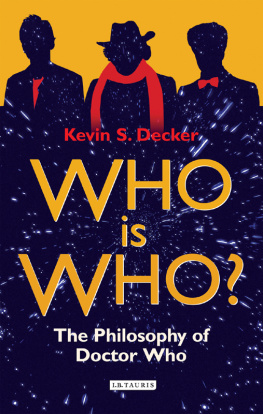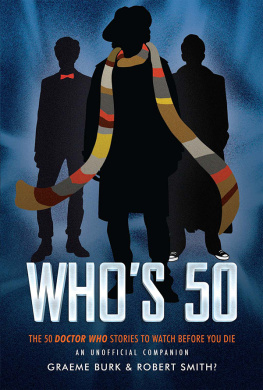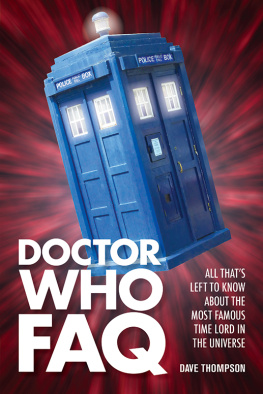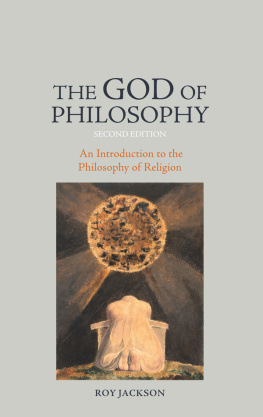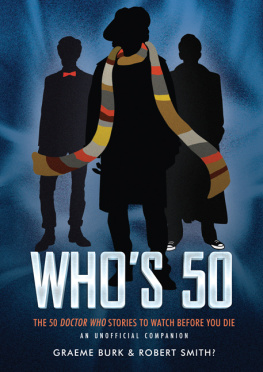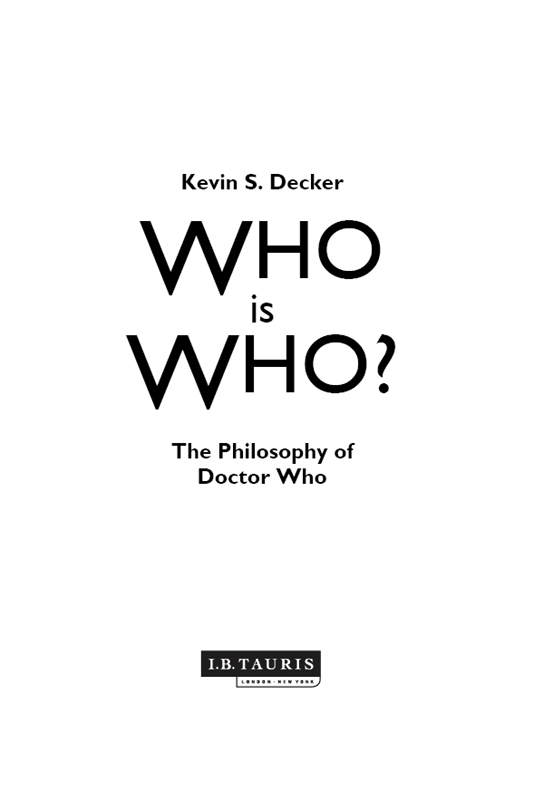Kevin S. Decker is Associate Professor of Philosophy and Associate Dean of the College of Arts, Letters and Education at Eastern Washington University. He has co-edited books on the philosophical significance of Star Wars , Star Trek and the Terminator films and television show.
Published in 2013 by I.B.Tauris & Co Ltd
6 Salem Road, London W2 4BU
175 Fifth Avenue, New York NY 10010
www.ibtauris.com
Distributed in the United States and Canada
Exclusively by Palgrave Macmillan
175 Fifth Avenue, New York NY 10010
Copyright 2013 Kevin S. Decker
The right of Kevin S. Decker to be identified as the author of this work has been asserted by him in accordance with the Copyright, Designs and Patents Act 1988.
All rights reserved. Except for brief quotations in a review, this book, or any part thereof, may not be reproduced, stored in or introduced into a retrieval system, or transmitted, in any form or by any means, electronic, mechanical, photocopying, recording or otherwise, without the prior written permission of the publisher.
ISBN: 978 1 78076 553 2
eISBN: 9780857734396
A full CIP record for this book is available from the British Library
A full CIP record is available from the Library of Congress
Library of Congress Catalog Card Number: available
For Suzanne, with love,
for putting up with the chase cards
and everything else.
CONTENTS
PREFACE
I m not exactly sure which was the first Doctor Who serial I watched, but I think it might have been Tom Bakers Terror of the Zygons, originally broadcast by the BBC in 1975 but watched by my younger self in syndication in 1982 on public television in St Louis, Missouri, United States of America. This story not only featured the flamboyant time traveller taking on shape-changing sea cucumbers (the eponymous Zygons) that had taken over part of Scotland but it also gave us a glimpse of the Loch Ness Monster. I was hooked! At the first peak of Doctor Who s popularity in my home country, the mid- to late-1980s, the programme was considered nothing more than a cult series. Nonetheless, even as it entertained, it offered substantive suggestions to its viewers about why truth and beauty are important and what constitutes living the good life (surely the attributes of what we call a classic!). Interestingly, these are the same things that philosophy strives for, at least when it is done well.
Since those early days, Doctor Who has become an eclectic, trans-Atlantic success story and has repaid the patience of its long-term audience by earning several places in the Guinness Book of World Records : in 2007, it was named the longest-running science fiction series in the world, while in 2010 it was elevated to the most successful science fiction television series in the world. This is all the more remarkable given two fundamentally mutable things Second, there are also the different permutations of the programmes genre focus over the years: edifying childrens show, adventure serial, politically subversive programme, horror, comedy, drama, even soap opera. Not even the control of a single show-runner in the re-envisioned version of Doctor Who since 2005 has inhibited the inherent plasticity of the basic premise of a madman and his blue box.
That same pluralism has informed my approach to the philosophy of Doctor Who in these pages. I will be the first to admit that feminists, queer theorists and scholars of critical race theory and postcolonialism will find much to critique in Doctor Who . Students of Derrida who expect a deconstruction of the Doctor will be disappointed, and analytic Wittgensteinians will lament the lack of precision in my prose. Critical theorists will find that my treatment of the programme is far too optimistic and not judgemental enough. There is no doubt that Doctor Who was created as, and has always been, a commodity, Marxists will affirm, and this too I cannot deny. Eschewing all these methodologies, wherever I have found a parallel between the changing Western Zeitgeist or particular theories in philosophy whether in continental, analytic, or American guises on the one hand,
I would like to thank the following for their inestimable contribution to the fruition of this book: all the members of the former St Louis Celestial Intervention Agency and those involved with the making of the Gateway to Time zine (especially Jeff Morris); pop culture and philosophy comrades-in-arms Jason T. Eberl, Robert Arp, Richard Brown and Bill Irwin; my friends and colleagues in philosophy at Eastern Washington University: Kerri Sadowski, Terry MacMullan, Mimi Marinucci, Chris Kirby, Kathryn Julyan and David Weise. I also appreciated the thoughts and comments of the students in my Philosophical Voices and Popular Culture classes of the 2011 and 2012 Winter Quarters. I want to offer special thanks to my time-travel research assistant, Sam Phelps, and to Ryan Weldon, who read the entire manuscript and offered comments that made it inestimably better. I should also like to thank Open Court Publishing Company, publishers of Doctor Who and Philosophy: Bigger on the Inside , and the books editors, Courtland Lewis and Paula Smithka, for permission to reprint material from the chapter The Ethics of the Last of the Time Lords, which forms a substantial portion of the current books .
My family gave me moral support and extra artron energy to finish this book: thank you Suzanne, Kennedy, Ethan and Jackson, and my mother, Carolyn Decker. Heres to more Doctor Who that my children can enjoy with their children! One caveat: Seriously, there is a tremendous amount of running through corridors involved.
INTRODUCTION
GERONIMO!
T he first question of many: why the philosophy of Doctor Who ?
The parallels between philosophy and Doctor Who are legion. Like philosophical reflection, the Doctors adventures are full of surprises; they develop through various twists and turns that could not have been predicted from the outset. The Doctor embraces mysteries of time and space; he fights ignorance and evil, and strives, in a complex universe, towards truth and the good.
More importantly, philosophy (the Greek roots of the word mean love of wisdom) and Doctor Who share a common origin: the experience of wonder. For this is an experience which is characteristic of a philosopher, this wondering: this is where philosophy begins and nowhere else, claims Platos Socrates.box, standing in a junkyard it can move anywhere in time and space? Quite so, chuckles the nameless Doctor, owner of the remarkable machine.
Fifty years later, the thing that looks like a police box still moves anywhere, its owners guests still wonder how it can be bigger on the inside, and the question posed by the shows title is still a live one: Doctor Who ? The ethics and worldview of the Doctor, who is nearly immortal and the last of his kind, continue to evolve. So also has the philosophy that underlies this BBC production that has worn many hats since 1963: science fiction, fantasy, Gothic horror, weird comedy, tragedy. This books explanation for the longevity of the longest-running science fantasy show in television history is that the whole interpretive approach of Doctor Who has changed faces more often than the Doctor himself.
A Brief History of Time (Travel)
At the beginning of his tenure as the 11th version of our favourite Time Lord, Matt Smith invited us to join him to see all of time and space, everything that ever happened or ever will. One question: where do you want to start? The Doctors own story, on the other hand, begins with very little for us to go on:

